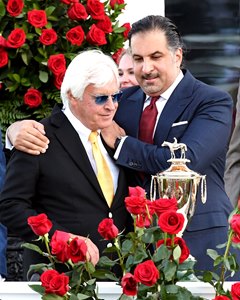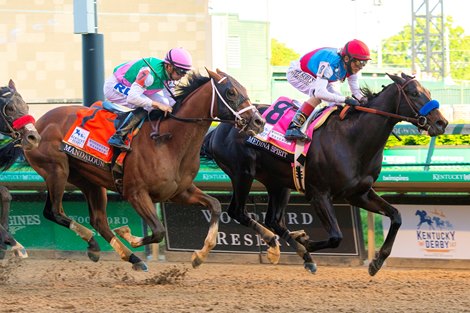Lawyers Argue Cases as Baffert Seeks Stay of Suspension


Attorneys for trainer Bob Baffert and the Kentucky Horse Racing Commission argued in court March 17 whether a stay should be granted to the trainer while he appeals a 90-day suspension related to the disqualification of Medina Spirit in the 2021 Kentucky Derby Presented by Woodford Reserve (G1) for a medication violation.
Additionally, KHRC executive director Marc Guilfoil testified before Franklin Circuit Court Judge Thomas Wingate, explaining his rationale for being the first to deny Baffert's stay request. Among his considerations, he said, was the KHRC's mission statement to maintain honesty and integrity.
Wingate gave no clear indication Thursday regarding which way he would rule but said he would make a decision by March 21, after which he suggested the losing side could bring the matter before the Kentucky Court of Appeals. Wingate stated in court that the Kentucky Court of Appeals could quickly hear an appeal of his ruling, perhaps within a 10-day time period. He suggested if Baffert is required to promptly serve a suspension, it would begin after the Kentucky Court of Appeals decision.
Last month, Kentucky stewards issued long-delayed rulings related to the Derby, fining Baffert $7,500 in addition to his suspension. Both Guilfoil and later the full commission of the KHRC declined to grant one, the latter decision on a 10-0 vote after three commissioners abstained or did not vote due to conflicts of interest or perceived conflicts of interest. A stay would have allowed Baffert to continue training until his appeal comes to a conclusion, though that process could take months or years, depending on the number of appeals.
The next step in the appeals process before the KHRC comes before a hearing officer April 18, Baffert attorney Craig Robertson told the judge, with up to four days of proceedings scheduled, though fewer days will likely be needed. KHRC protocols then call for a hearing officer to offer a recommendation to the KHRC, which the regulator typically accepts but is not obligated to do so. Should an appeal before the KHRC prove unsuccessful, the court system is the further option.
If such a regulator suspension from the KHRC takes place, all racing jurisdictions in North America will honor the suspension due to reciprocity. This is in contrast to the private-property suspension issued by Churchill Downs Inc., preventing Baffert from racing at its tracks through mid-2023.
The suspension and fine to Baffert were handed down due to the Zedan Racing Stables-owned Medina Spirit testing positive for betamethasone after crossing the wire first in the Kentucky Derby. Also in February, stewards declared Juddmonte's Mandaloun the winner with Medina Spirit's disqualification.

Historically, the KHRC has granted stays of contested trainer suspensions over medication violations—neither Guilfoil nor KHRC general counsel Jennifer Wolsing could recall in court an instance where it did not occur—though this case is unique as it involves the Derby and followed a series of well-publicized medication violations from Baffert in the year leading up to the race. The KHRC counts four sanctions issued toward Baffert in a one-year time period, though Baffert's legal team disputes two of those. They believe the trainer was exonerated when the Arkansas Racing Commission tossed aside two disqualifications and a suspension to the trainer from the spring of 2020, though Arkansas still issued two separate $5,000 fines to Baffert under the trainer responsibility rule.
Baffert's legal team argues that Baffert should not be sanctioned, nor Medina Spirit disqualified, due to test results they obtained from the New York Equine Drug Testing and Research Laboratory stating that Medina Spirit showed in his system the presence of betamethasone valerate, not betamethasone acetate. This was due to Medina Spirit receiving pre-Derby applications of the prescribed anti-fungal cream Otomax for a skin condition noted in veterinary records, they argue.
In explaining his decision to not grant a stay, Guilfoil called into question Baffert's failure to fulfill his fall 2020 public statement to improve medication compliance and oversight. At the time, Baffert said he would hire Dr. Michael Hore of Hagyard Equine Medical Institute to assist in that endeavor, though Hore acknowledged to BloodHorse in May, shortly after the Derby positive, that his role by that point "did not materialize as intended." Travel restrictions and COVID-19 were announced by Hore as factors. Hore is based in Kentucky, Baffert in California.
Guilfoil's testimony was the first public explanation for why he denied the stay. Earlier in a letter to Baffert's attorneys, he simply wrote that he "did not find good reason" to grant it.
Speaking in court Thursday, Guilfoil questioned Baffert's judgment if Otomax was applied to Medina Spirit.
"You've got to look at the ingredients you put in the horse. That's Training 101 to me," he said.
Otomax, marketed by Merck for treating canine ear infections, lists betamethasone valerate on its packaging below the name of the product.
Guilfoil expressed frustration at Baffert's denials and shifting explanations related to the drug positive in the days after the initial drug positive was reported last year. He also noted that by his count, Baffert had a medication violation on average every 88 starts over a period of 365 days, including the 2021 Derby.
Clark Brewster, who represents Zedan Racing Stables and also Baffert, countered in his argument, presented via videoconference, that Baffert had only one prior medication positive in 29 years of racing in Kentucky prior to Medina Spirit.
That also was for betamethasone and led to the disqualification of Gamine from a third-place in the 2020 Longines Kentucky Oaks (G1). Her drug positive led to a $1,500 fine for Baffert, but not a suspension. Baffert's attorneys say she was treated 18 days prior to the Oaks, but the drug didn't clear her system per withdrawal guidelines because two joints received treatment.
Betamethasone is a corticosteroid, permitted for use in horses, but not allowed in a horse's system on race day. It has a recommended 14-day withdrawal period following injections.
In his initial statement before the court, Robertson said Baffert has been unfairly treated compared to other trainers with similar violation records.
"Forget the last 365 days. Let's talk about the last five years, 10 years, 15 years. Here's the total number of days of suspension that any racing jurisdiction has (ultimately) given to Mr. Baffert: zero."
Baffert's attorneys believe KHRC restrictions on betamethasone are toward betamethasone acetate, which is the type of betamethasone given to horses via joint injections.
The KHRC disputes that interpretation of its rules, with KHRC general counsel and other KHRC attorneys writing to Wingate in court documents that "the Commission's regulations prohibit a horse from carrying betamethasone in its body during a race, regardless of the route of administration." They added that "the source of the betamethasone is scientifically irrelevant to its pharmacological effect."
Some KHRC regulations covering restricted substances cite betamethasone, while others note betamethasone acetate. This ambiguity is a key element of Baffert's case.
Medina Spirit died in December after collapsing following a workout at Santa Anita Park in an incident considered unrelated to treatment with betamethasone more than seven months earlier.
In making his Monday decision, Wingate must conclude that Baffert and Zedan Racing Stables would suffer irreparable harm in the absence of a stay and that their appeal would have a strong chance of success.
Robertson argued in his opening statement that according to California regulations for trainers issued a 90-day suspension, Baffert would need to disband his stable for the length of the suspension, which he said would be "devastating." He also noted the suspension would cover the dates of the Triple Crown, an annual focus for the trainer and his clients. Baffert has won the Derby six times, the Preakness Stakes (G1) on seven occasions, and the Belmont Stakes (G1) three times. Two of his horses have won the Triple Crown.
"Why are we ending the man's Hall of Fame career over a topical ointment, a topical ointment that was prescribed by a veterinarian, administered per veterinarian's recommendation, and records of that prescription administration were contemporaneously provided to the regulator?" he argued.
Wolsing countered in her remarks that sanctions were justified in light of four medication positives in a 365-day period, causing stewards to increase his penalty beyond KHRC guidelines that only listed a trainer potentially having as many as three violations in a year.
"Your Honor, it is not every day that a trainer accrues enough medication positives to literally go off the charts in a disciplinary regulation," she said. "But on May 1, 2021, that is precisely what Bob Baffert did. And those repeat offenses give rise to the commission's justifiable concern that he presents an elevated risk of reoffense."
